Testing The Temperature 6
What do voters in Northern Ireland think about the Protocol on Ireland/Northern Ireland?
David Phinnemore, Katy Hayward and Lisa Whitten[1]
October 2022
The report is available to download here:
Key Findings
- Opinion among voters in Northern Ireland on the Protocol on Ireland/Northern Ireland continues to be deeply divided, with only a small proportion of respondents having ‘no opinion’ on the topic.
- A majority (54%) currently see the Protocol, with grace periods, as the appropriate means for managing the impact of Brexit on Northern Ireland and 53% as overall ‘a good thing for Northern Ireland’; 34% and 39% of respondents respectively are of the opposite view.
- Over two thirds of respondents (70%) believe that particular arrangements for Northern Ireland are necessary to manage the impact of Brexit.
- Over 6 in 10 respondents (62%) do not think that Brexit is overall ‘a good thing’ for the United Kingdom.
- The most negative views on the perceived current impact of the Protocol are in relation to its political implications and most positive are on its economic consequences.
- 51% think the Protocol is having a positive impact on the Northern Ireland economy, and 63% think it offers unique opportunities that could benefit Northern Ireland.
- 62% think it is having a negative impact on political stability in Northern Ireland and 60% think the same about its impact on British-Irish relations.
- 47% think the Protocol is positive for the 1998 Belfast (Good Friday) Agreement whilst 39% think it is having a negative effect on it.
- 49% think the Protocol is having a negative impact on Northern Ireland’s constitutional place in the UK and 47% see it as negative for Northern Ireland place in the UK internal market.
- 32% of voters in Northern Ireland have no concerns about the full operational scope and impact of the Protocol; 56% do have concerns about the Protocol were it to be fully implemented with no adjustment after the grace periods.
- Among those who have concerns, customs declarations for parcels are the issue of most concern (64%, equating to 36% of respondents overall) followed by restrictions on plants and seeds and chilled meats being brought into Northern Ireland from Great Britain and requirements for bringing pets from Great Britain into Northern Ireland (of concern to 33% and 32% of respondents overall respectively).
- The issue of least concern is Northern Ireland aligning with the EU’s standards for the production of goods (24% of respondents overall are concerned), followed by the application of EU rules on subsidy control and state aid (27% of respondents overall are concerned).
- There are mixed levels of trust/distrust in political actors and institutions when it comes to managing Northern Ireland’s interest with respect to the Protocol.
- The UK government is by far the most distrusted (84% distrust including 49% strongly distrust) and least trusted (7% trust) of all actors.
- Voters in Northern Ireland are marginally more inclined to trust (47%) than distrust (43%) the European Commission/EU.
- These results are similar to those for the Irish government regarding the Protocol (43% distrust, 45% trust) with trust levels increasing compared to previous polls.
- The SDLP and Alliance the most trusted of the five parties (respectively 43% and 42% trust, and 43% and 41% distrust) and the DUP is the most distrusted (67% distrust, 24% trust).
- Northern Ireland business representatives continue to be the only actors who enjoy the trust of a majority of respondents (57%) in managing Northern Ireland’s interests with respect to the Protocol.
- There are clear patterns with respect to the majority view of voters in Northern Ireland when it comes to what should happen next with the Protocol.
- A clear majority of respondents (71%) would prefer to see the UK and the EU reaching an agreement on the Protocol’s implementation than the UK take unilateral action.
- More respondents (46%) are currently optimistic that the UK and the EU can agree an acceptable resolution; a third of respondents (34%) are not optimistic.
- A clear majority (59%) does not believe the UK would be justified in taking unilateral action to suspend elements of the Protocol; however, 36% believe that the UK government would be justified in doing so.
- 52% maintains that the EU would be justified in taking retaliatory action if the UK did take unilateral action to suspend elements of the Protocol. Over a third (37%) disagree.
- Self-declared understanding of the Protocol remains high, with a clear majority indicating that the most reliable sources of information on the Protocol are political parties for whom they would be willing to vote and business organizations.
- A substantial majority of respondents (74%) continues to claim ‘a good understanding’ of the Protocol.
- Radio and television news and talk/discussion programmes are the most frequently accessed sources of information on Brexit and the Protocol – 61% and 57% of respondents respectively.
- Three-quarters or more of respondents either never or only occasionally or rarely access information from official websites (e.g. UK government, Northern Ireland Assembly, European Commission) (73%), academic/think tanks (75%), business organizations (76%), or civil society organizations (84%).
- Political parties for whom they would consider voting are regarded by respondents as the most reliable sources of information by three-quarters of respondents (76%); second were business organizations (67%) followed by official websites (e.g. UK government, Northern Ireland Assembly, European Commission) (62%).
- Respondents remain split on how their MLAs should vote in the 2024 ‘democratic consent’ vote.
- Half (50%) of respondents currently favour MLAs voting for the continued application of the Protocol; 41% want MLAs to vote against.
- In an election to the Northern Ireland Assembly, a candidate’s position on the Protocol would be important for 84% of respondents; just over a third would vote for candidates who either oppose consent in 2024 (11%) or who are in favour of scrapping the Protocol (24%).
- Almost two-fifths of respondents (37%) would vote for candidates in favour of consent; a further 12% would vote for candidates in favour of consent provided the UK and the EU agreed to minimal GB-NI checks and controls.
- If the UK and the EU agreed a reduction of checks and controls on GB-NI movements of goods, the proportion of respondents in favour of consent in 2024 would rise to 41%, with a further 28% favouring consent depending on whether the checks and controls were minimal (11%) or the implications for Northern Ireland’s economy (17%).
- Respondents are clear on whether the Northern Ireland Executive should be established.
- Almost a third of respondents (30%) agreed that the Northern Ireland Executive should not be established until the Protocol is scrapped altogether. More than double that proportion (66%) disagreed.
- Two-thirds of respondents (65%) agree that the Northern Ireland Executive should be fully functioning regardless of what happens with the Protocol. A third (32%) disagree.
Introduction
As part of a three-year ESRC-funded research project on the Protocol on Ireland/ Northern Ireland, a series of regular surveys has been commissioned to ‘temperature test’ voter attitudes on a range of issues relating to Brexit, the Protocol, and their implications for Northern Ireland. This is the only polling in Northern Ireland dedicated to the topic of the Protocol and which has been running at regular intervals since the Protocol entered fully into force on 1 January 2021 following the end of the transition period.
The surveys are being conducted every four months during 2021-2023 by LucidTalk using its online Northern Ireland Opinion Panel. This means that the survey is not based on systematic random sampling across Northern Ireland society. Instead, it is a reliable indicator of the opinion of Northern Ireland voters who take an interest in current affairs and politics, and who are likely to exercise their right to vote.
LucidTalk have a strong track record of accurately predicting election and referendum results in Northern Ireland on the basis of polling this Opinion Panel. The results presented here are from a sample of 1499 responses to the survey undertaken on 7-10 October 2022. The sample of responses used is weighted to be representative of the adult population of Northern Ireland (e.g. by age, gender, region). All results presented are accurate to a margin of error of +/-2.3% at 95% confidence.
The context for this poll
This sixth survey was held 21 months after the end of the 11-month transition period that followed the UK’s withdrawal from the EU on 31 January 2020. It was the third survey in 2022, and followed previous surveys in February 2022 and June 2022. The first three surveys took place in March 2021, June 2021 and October 2021.
As with previous polls, the survey was conducted in a context of ongoing contestation around the Protocol. In Northern Ireland, the Democratic Unionist Party (DUP) was continuing to refuse to nominate either a Speaker to the Assembly or a deputy First Minister until the UK government had taken ‘decisive action’ on the Protocol. In UK-EU relations, there continued to be differences over arrangements for the implementation of the Protocol with the UK seeking significant changes to the Protocol.
Among the key developments since the previous survey was the introduction by the UK government in June of the Northern Ireland Protocol Bill which, if approved, would allow the UK government to take unilateral action to disapply core elements of the Protocol. The bill also contained proposals for a ‘dual regulatory regime’ for Northern Ireland and for a system of red and green channels to allow for goods from Great Britain to enter Northern Ireland free of checks and controls provided they were remaining in Northern Ireland. The EU’s response was, on the one hand, to provide updated proposals for resolving issues concerning customs and SPS under the Protocol, and, on the other, to revive an existing and introduce some new infringement proceedings against the UK for alleged breaches of its obligations.
During the summer, the bill made progress through the House of Commons, and moved to the Lords for consideration. Following approval of the bill by MPs in late July, the European Commission announced a further set of infringement proceedings.
By the time the poll was conducted on 7-10 October, there were, however, signs of improving relations between the UK and the EU. This followed the departure of Boris Johnson as Prime Minister and his replacement by Liz Truss. Under her premiership, UK-EU talks on seeking to resolve differences over the Protocol were restarted with both sides stressing the desire to reach a negotiated settlement of outstanding issues and avoid any unilateral action, even though the UK government remained committed to the Northern Ireland Protocol Bill.
As part of a wider ‘re-set’ in UK-EU relations, Truss participated in the inaugural Prague meeting of the European Political Community in early October and initial contacts were held between, James Cleverly, the new UK Foreign Secretary, and his fellow co-chair of the EU-UK Joint Committee, Maroş Šefčovič. The European Commission also acceded to UK requests for additional time to respond to the infringement proceedings and did not immediately contest the UK’s announcement that it would be continuing with ‘grace periods’ for checks and controls on GB-NI movements of goods.
Such re-engagement and the accompanying reports of improved ‘mood music’ in UK-EU relations could not hide the fact that there remained significant differences between the UK and the EU on how outstanding issues concerning the Protocol should be resolved. And Northern Ireland still lacked a functioning Executive and Assembly.
Respondents to the poll on 7-10 October were asked six sets of questions and offered the opportunity to provide written comments in response to the poll. The questions covered attitudes towards Brexit and the Protocol, assessments of the impact of the Protocol, issues of concern, sources of information on Brexit and the Protocol and their perceived reliability, trust in different actors to manage Northern Ireland’s interest regarding the Protocol. The survey also asked participants how they would like members of the Northern Ireland Assembly (MLAs) to vote in the ‘democratic consent’ vote on Articles 5-10 of the Protocol that will be held at the end of 2024 and the importance of the Protocol for any future Northern Ireland Assembly election. A final section included questions on whether the UK would be justified in taking unilateral action to suspend elements of the Protocol, other issues related to the Northern Ireland Protocol bill, and on the formation of a Northern Ireland Executive.
Attitudes to Brexit and the Protocol
Current opinion on Brexit and the Protocol continues to be divided and generally consistent with the previous ‘Testing the Temperature’ polls held in 2021-22. The small increases in more positive opinion of the Protocol (initially identified in October 2021) are once again seen in this latest poll.
Three quarters of respondents claim a ‘good understanding’ of the Protocol (see Figure 1). The proportion of respondents who think that reliable information exists on the Protocol (44%) is slightly lower than the 47% in February 2022 yet above the lowest level recorded to date of 37% in March 2021.
In line with previous polls, over two thirds of respondents agree that ‘particular arrangements’ for Northern Ireland are needed to manage the effects of Brexit; On this occasion, 70% are of such a view compared to 72% in June and 67% in February 2022. The proportion of all respondents being strongly of this view (49%) confirms the rise noted in June (to 50%) compared to the February poll (44%). There continues to be a clear majority (62%) who disagree that Brexit is on balance ‘a good thing for the UK’, with 54% being strongly of that opinion. The figures are higher than in June 2022 (59% and 50% respectively). One third of respondents (32%) agree or strongly agree that Brexit is on balance ‘good’ for the UK; this is down from 33% in June and 36% in February 2022.
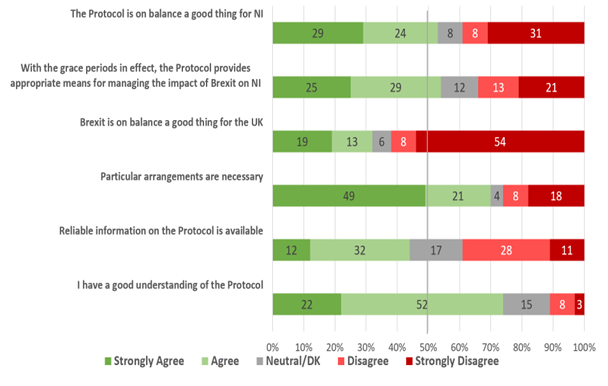
Figure 1. Opinion of Brexit and the Protocol[2]
The proportion of respondents who agree or strongly agree that, with grace periods in effect, the Protocol provides an appropriate means for managing the effects of Brexit for Northern Ireland stands at 54%. This compares with the June 2022 figure of 55%, although importantly the question on that occasion did not reference the grace periods being in effect. As in the June 2022 poll, 53% of respondents regard the Protocol as ‘on balance, a good thing’ for Northern Ireland. In the two previous polls, half of respondents were of this view. In June 2021, the figure was lower at 43%. In terms of respondents disagreeing with the proposition, the overall figure of 39% is marginally higher than in June 2022 (37%).
This shift in opinion to majority acceptance of the Protocol – with grace periods in place – is also reflected in responses to the question on whether the Protocol provides Northern Ireland with a ‘unique set of post-Brexit economic opportunities compared to the rest of the UK which if exploited could benefit Northern Ireland’. Almost two thirds of respondents (63%) agree that there are economic opportunities from the Protocol. The figure is slightly lower than in June 2022 (65%) but in line with upward trend through the previous polls in March (50%), June (57%) and October 2021 (62%) and in February 2022 (63%). Just over a quarter of respondents (28%) disagree; a figure slightly higher than in the three previous polls (25-26%), but lower than in June 2021 (34%).
Views on the impact of the Protocol
The survey asked respondents for their assessment of the current impact of the Protocol. Important to note here is that grace periods for the application of some of the Protocol’s provisions are in place and various formalities, checks and controls on the movement of goods into Northern Ireland from Great Britain are either not being implemented or only being implemented partially.
Opinions remain divided on the impact of the Protocol (see Figure 2). Around three fifths of respondents (62%) see the Protocol impacting negatively on political stability in Northern Ireland. This is marginally up on the 59% seen in June 2022 and October 2021 although down on other polls (e.g. February 2022 – 64%, June 2021 – 68%).
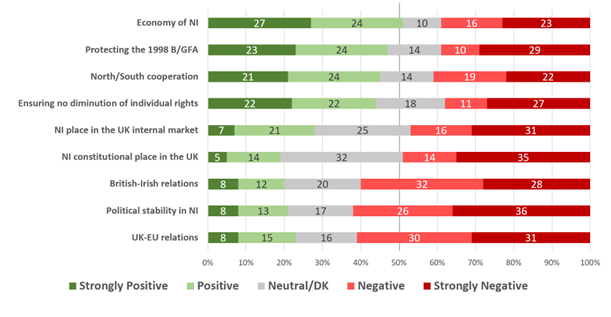
Figure 2. Overall assessment of the current impact of the Protocol[3]
The Protocol’s current impact on British-Irish relations and UK-EU relations is regarded by around three fifths of respondents (60% and 61% respectively) as negative, figures that are in line with the findings of the previous three polls. In June 2021, the figures were higher at 67% and 70% respectively.
The proportion of respondents seeing the Protocol’s current impact as negative on Northern Ireland’s constitutional position in the UK (49%) has risen slightly since the June 2022 poll (46%); the proportion seeing the Protocol’s current impact on Northern Ireland’s place in the UK internal market as negative remains unchanged at 47%. The proportions remain lower than in the October 2021 poll (when they were 57% and 54% respectively).
On the impact of the Protocol on ensuring ‘no diminution’ of individual rights as set out in the 1998 Agreement, the gap between those who see the current impact of the Protocol as positive (44%) and those who view the current impact as negative (38%) is closer than in June 2022 (48% positive and 37% negative respectively).
As in the previous polls, opinions have shifted on other topics. In the first poll (March 2021), only a third of respondents viewed the current impact of the Protocol as positive regarding the economy of Northern Ireland, the 1998 Agreement, and north-south cooperation. Now, in October 2022, the proportion is closer to half, although in each case the figure is lower by three or four percentage points than in June 2022.
On the question of the impact of the Protocol of the economy of Northern Ireland, 51% currently view it as positive (down from 55% in June 2022). Just under half of respondents (47%) view the current impact of the Protocol on protecting the 1998 Agreement as positive (down from 50% in June 2022); 39% view it as negative. As for north-south cooperation, the gap between those viewing the current impact of the Protocol as positive (45%) as opposed to negative (41%) has narrowed markedly since June 2022 (49% positive against 37% negative).
Written comments expressing positive and negative views
Views expressed in the optional written comments section of the poll were also divided. The reporting of these comments is not weighted to be representative. We note that TUV and Alliance Party supporters are over-represented in the unweighted sample, although we do not know of course from which supporters the comments come.
Among those expressing negative views of the Protocol in their comments, 20% are opposed to it in principle while 6% oppose its practical implications.[4] The views expressed included:
“The protocol does nothing but create more tension by infringing on the constitutional position of Northern Ireland within the UK. The only good thing that come[s] from the protocol is the removal of the Belfast Agreement. We are reaching a point where Unionism is no longer prepared to accept mandatory coalition.”
“The protocol needs to be scrapped completely, not just tampered with.”
“No Irish Sea border. Scrap the protocol.”
“The protocol needs to be scrapped as it seriously impacts Northern Ireland’s constitutional position as part of the United Kingdom and Great Britain.”
“The Protocol is morally shameful, an administrative nightmare, damaging to the Northern Ireland economy, and strongly divisive.”
“No Irish Sea Border. The implementation of the protocol breaches the Good Friday Agreement.”
“I run a small business which I used to import a lot from GB, I now have about half the items I used to sell because they are a lot more expensive to buy from the EU, the protocol has halved my turnover so it's been disastrous for me.”
“I had a business before Brexit and the Protocol. Because of it I have had to close my business. I am now unemployed and in danger of loosing my home. Northern Ireland should not be separated in any way from GB.”
“My main concern is the democratic deficit created by the protocol since the north no longer has MEPs or a direct conduit to the European Commission. While not a major concern which would make me not support the protocol, I would still like to see it corrected by policy makers.”
Among those who present a positive view of the Protocol in their comments, 5% see it as a ‘least-worst’ mitigation in the context of Brexit; 7% see it as potentially beneficial for Northern Ireland if it can be implemented well, this group often link this to the need for political stability; 9% see the Protocol as already beneficial for Northern Ireland.
“Overall, the Protocol has been good for the NI economy. The DUP has no interest in sharing power with Sinn Fein whilst they are playing 2nd fiddle & are using the Protocol as an excuse for not returning to the Executive.”
“The politicians should listen more to the business community, the majority of who find the Protocol a positive for their businesses.”
“The protocol makes NI trading arrangements unique and if it is settled businesses will invest to gain dual access and NI place is UK secured as it will be only area of growth hence no UI as it would be too valuable economically to British government. No business would invest in GB as exporting too difficult issues at ports not publicised by mainstream media.”
“Brexit was a disaster for Northern Ireland and the UK. The Protocol needs adjustment but not removal.”
“Brexit has been disastrous but the protocol (with agreed amendments) could be beneficial to the economy of Northern Ireland.”
“The protocol is the best of a bad deal. Political Unionism needs to own its mistakes and stop holding other parties to ransom over a protocol that cannot be changed in any way in Northern Ireland. It is the responsibility of Westminster.”
”We, in NI, were learning to live together in peace, since 1998. The brexit arrangements were drawn up between UK and EU governments. All done in good faith. Now let us make the best of this situation. We can live together, as a functioning part of the UK, with every advantage that protocol arrangements afford”
“Brexit was a huge mistake for the people of Northern Ireland and the UK, and has caused massive harm to the UK economy.”
”Brexit is what damages relations. Truly disastrous for NI. Protocol isn’t perfect but helps us avoid the worst repercussions.”
Concerns regarding the operation of the Protocol
Previous polls have sought to identify those aspects of the Protocol and its implementation that cause most concern to voters. The main issues raised related to the impact of the Protocol on the availability of medicines in Northern Ireland and the customs paperwork required for the movement of goods from Great Britain into Northern Ireland. These were followed by the lack of involvement of elected representatives, officials, and civic society from Northern Ireland in the governance of the Protocol.
This latest poll, like the June 2022 poll, adopted a slightly different approach, establishing first whether the respondents have concerns about the Protocol’s full operational scope and impact. A majority (56%) said they do have concerns about the full operational scope of the Protocol (i.e. without current grace periods and assuming full implementation) and its impact. The proportion is similar to June 2022 (55%). 32% of respondents said they have no such concerns (see Figure 3). In June, 36% of respondents said they had no such concerns.
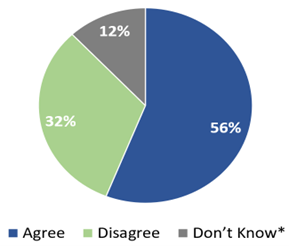
Figure 3. Do you have any concerns about the Protocol’s full operational scope and impact?
* Includes Not Sure/No Opinion
Those with concerns were then asked to indicate how concerned they were about eight issues. We selected these issues as those that relate most closely to the UK Government’s concerns and to the end of the grace periods.
The issue of most concern to this 56% of respondents was, as in June, customs declarations for parcels being moved into Northern Ireland from Great Britain. Of those indicating concern, 64% indicated they were ‘highly concerned’ about this matter. This translates to 36% of the total weighted sample being ‘highly concerned’ about customs declarations being required under the Protocol for parcels moving from Great Britain into Northern Ireland. Other issues of most concern were potential restrictions on plants, seeds and chilled meats being brought into Northern Ireland from Great Britain (see Figure 4). The order of concern is the same as in June 2022.
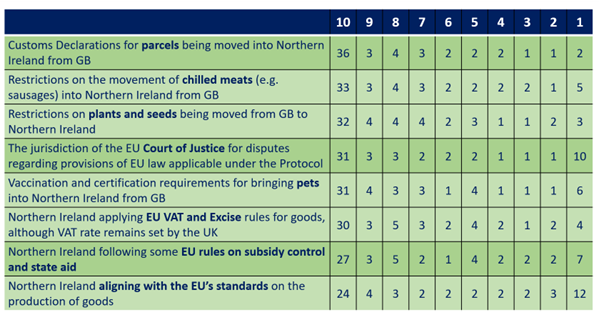
Figure 4. Relative importance of issues for the 56% of voters with concerns about the full scope and impact of the Protocol, i.e. without current grace periods and assuming full implementation
(10 = Highly Concerned, 1 = Not Concerned at All)
Northern Ireland’s alignment with EU standards on goods is the issue of least concern to the 56% of respondents to the poll with concerns, and at 42% is lower than in June 2022 (47%). There was also a slight increase in the proportion of those with concerns about the scope and impact of the Protocol if it were fully implemented having no concerns on either the alignment issue (22% against 20% in June 2022) or the jurisdiction of the EU Court of Justice (18% against 16% in June 2022).
Information about Brexit and the Protocol
In each of the previous polls, around three-quarters of respondents have claimed a good understanding of the Protocol even though less than half have maintained that reliable information exists on the Protocol. The latest poll asked what sources of information on Brexit and the Protocol respondents use and how reliable they consider each of these sources.
The most widely used sources are on radio and television with news programmes being the most frequently used (61%), slightly ahead of talk/discussion programmes (57%). Such sources are, however, only regarded as reliable by 53% and 45% respectively of respondents. The most reliable sources of information on Brexit and the Protocol, according to two thirds of respondents (76%) are political parties for which respondents would consider voting (see Figure 5). Half of respondents (51%) indicate that they use such political parties frequently for their information on Brexit and the Protocol.
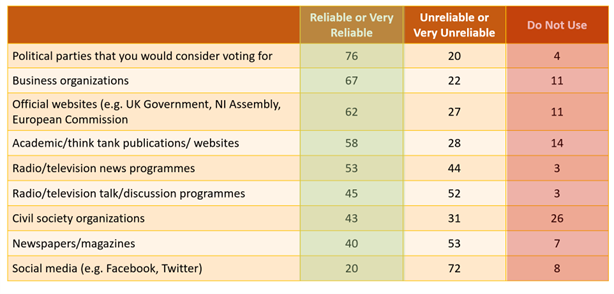
Figure 5. Reliability of Information Sources for Providing Factual and Fact-based Analysis of Brexit and the Protocol
Also, among the most reliable sources on Brexit and the Protocol are business organisations (67% of respondents regard them as reliable), official websites such as those of the UK government, the Northern Ireland Assembly and the European Commission (62%) and academic/think tank publications and websites (58%). These sources, however, are among the least used. Only one quarter of respondents access them frequently.
The sources of information frequently accessed the least are civil society organizations (16%), although they are viewed as more reliable (43%) than newspapers and magazines (40%) which are frequently accessed by 42% of respondents, a rate marginally below that of social media (e.g. Facebook, Twitter) which is seen as the most unreliable source of information by almost three quarters (72%) of respondents.
Trust to manage the interests of Northern Ireland vis-à-vis the Protocol
Implementation of the Protocol involves a range of actors. As with all five previous polls, the only group that is trusted by a majority to manage the interests of Northern Ireland with respect to the Protocol are Northern Ireland’s business representatives (57%) (see Figure 6). The level of trust is slightly down on the 60% in June 2002, the highest figure to date.
Trust in the UK government when it comes to managing the interests of Northern Ireland with respect to the Protocol continues to be very low (7%), although it is the highest of the six polls conducted. More than four fifths of respondents (84%) continue to distrust the UK government. A majority continue to distrust it ‘a lot’ (49%) although this is an improvement on the 55% in June 2022.
By contrast, trust to manage the Protocol in the interests of Northern Ireland remains at 47% for the European Commission/EU and at 45% for the Irish government. However, views are sharply divided, with 43% distrusting both the EU and Irish government. Only around 10% hold no opinion on whether they can trust these actors or not.
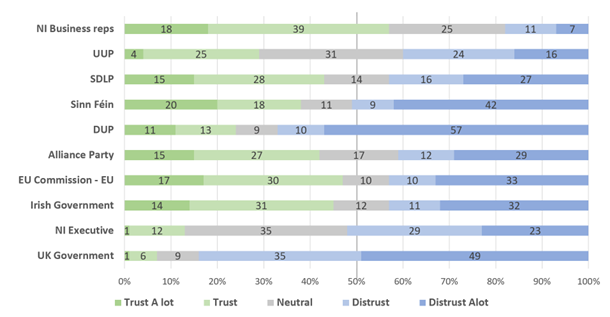
Figure 6. Levels of trust in/distrust of actors to manage the interests of Northern Ireland with respect to the Protocol
Trust in the Northern Ireland Executive to manage the interests of Northern Ireland with respect to the Protocol remains strikingly low (13%) and has fallen by almost one-third since June 2022 (19%). Only the UK Government suffers lower levels of trust. Moreover, although between the two previous polls there was a slight drop in levels of distrust to 44%, in this latest poll, the proportion of respondents who distrust the Northern Ireland Executive to manage Northern Ireland’s interests has risen markedly to 52%
As for the five political parties that formed the last Northern Ireland Executive, the Alliance Party has seen the level of trust in it drop from 50% in June to 42% with the gap between ‘trust/trust a lot’ and ‘distrust/distrust a lot’ widening from one percentage point to 12 percentage points. It remains, along with the Social Democratic and Labour Party (SDLP) (43% trust/trust a lot – unchanged) one of the two most trusted of the five political parties considered here. Distrust in the SDLP has also risen (43%) since June (38%) and is now similar to the level of distrust in the Ulster Unionist Party (UUP) (40%). Trust in the UUP (29%) remains steady; almost a third of respondents (31%) remain undecided on whether they trust the UUP to manage Northern Ireland’s interests on Brexit and the Protocol. Two thirds of respondents (67%) continue to distrust the DUP, with a majority (51%) also distrusting Sinn Féin.
Written comments on politics and political parties in Northern Ireland
Comments provided by respondents for this poll included some general and specific criticisms of politics in Northern Ireland. There was, however, significant criticism of the DUP, with 13% of optional written responses focusing on the party’s approach to the Protocol and its decision not to enter a new Executive in protest against the Protocol:
“Tell the DUP that I can't eat or heat my house with the protocol.”
“Disagree with the DUP's boycott of the NI assembly. MLAs should not be paid if they're not sitting.”
“The DUP, not the protocol, is having a negative impact on political stability, British-Irish relations, and EU-UK relations.”
“Get the Assembly back to work and if the DUP don’t want to play then let them step aside.”
“The DUP are a disgrace the way they are treating all the electorate.”
“The DUP are the main obstacle in any progression to compromise.”
Alongside comments directed at the DUP, 13% of submitted comments stated general opposition to the lack of fully functioning devolved government in Northern Ireland at present:
“We are in an economic crisis and even though the assembly has not proven to be of much use over the years it does need to be in operation and it is abhorrent that one party is holding the country to ransom and I speak as a unionist voter for which the Dup does not represent my views as a Remainer.”
“MLAs need to get back work immediately. DUP veto is unacceptable and is not democratic. NI voters expressed their strong desire to remain in EU and this should be respected by UK Govt.”
“The information I am aware of reflects the protocol as a net positive in terms of our economy and growth in NI. However personally I think it takes away from the real issues facing our society currently and politicians need to get back to work to address areas such as the cost of living, energy crisis, inflation and supporting our public sector staff and Health Service going into the winter months.”
“Time for political parties to get back to work regardless of their issues with protocol.”
“The DUP's boycott from Stormont has nothing to do with the protocol. They're punishing local people here, who have no control over the protocol negotiations. It's time they got back to work.”
“The protocol is being used as an excuse by some political parties to not do any work. These parties are happy to have different laws than the rest of the UK for gay marriage, abortion, conversion therapy, language rights, corporation tax, defamation, hunting, water charges.”
Views expressed in the comments were, however, divided with a small number also stating support for the DUP’s refusal to nominate a speaker to the Northern Ireland Assembly or a deputy First Minister to the Northern Ireland Executive over the Protocol. For example:
“Stormont shouldn’t return until the Protocol is removed.”
“The NI executive should not sit in Stormont until the protocol is abolished.”
These views are also reflected in the quantitative results of this polling, as discussed below.
Democratic consent and MLAs
The future of core provisions of the Protocol – those relating primarily to the movement of goods (i.e. Articles 5-10) – is subject to the democratic consent of members of the Northern Ireland Assembly (MLAs) in a vote that is to be held up to every four years. MLAs will first vote in November/December 2024.
Most respondents (91%) have a view on how they wish their MLAs to vote: 50% in favour of the continued application of Articles 5-10 and 41% against (see Figure 7). These mirror the figures from October 2021 and so once again confirm the marked gap in views that has emerged since the June 2021 poll when voters were split almost evenly (46% in favour and 45% against).
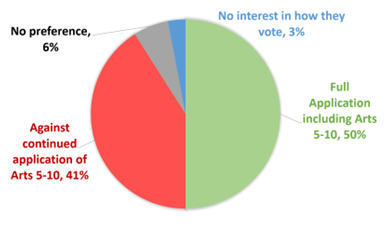
Figure 7. How would you like the MLAs you voted for in the most recent Assembly election to vote in the democratic consent vote on the Protocol in 2024?
These latest figures show considerable continuity in the positions expressed since our polling began in early 2021 (see Figure 8), although the margin between the two positions has narrowed from its largest to date in the June 2022 poll.
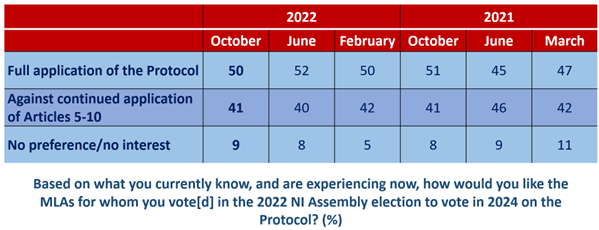
Figure 8. Comparing views on the ‘democratic consent vote’ over the six polls
As in most previous polls we asked how a candidate’s position on the Protocol might affect a respondent’s willingness to vote for them. If there were an election to the Northern Ireland Assembly in the next four months, the position of a candidate would be a factor for more than four fifths (84%) of respondents. Of these, just over a third (35%) would vote for candidates either opposed to consent in 2024 (11%) or wanting to see the Protocol scrapped (24%) (see Figure 9). This is in line with the February 2022 poll when the proportion of respondents was 37% and a just over a quarter overall (27%) wanting the Protocol scrapped.
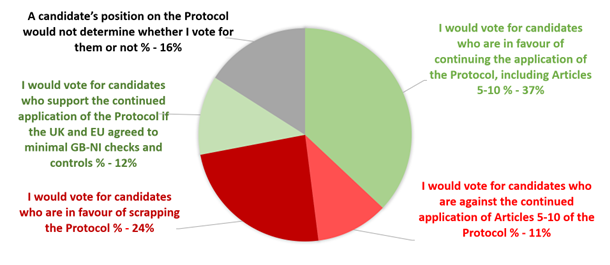
Figure 9. If an election to the Northern Ireland Assembly were to take place in the next 4 months, how important would an MLA's position on the Protocol be to your vote?
In terms of support for consent in 2024, just over a third of respondents (37%) would vote for candidates in favour of the continued application of the Protocol, with the proportion rising to almost half (49%) if the UK and EU agree to minimal GB-NI checks and controls. When a similar question was asked in February 2022, 43% said they will only vote for candidates in favour of the continued application of Articles 5-10 of the Protocol. The response in this latest poll highlights the significance of the UK and EU reaching an agreement on ensuring that there are only minimal GB-NI checks and controls under the Protocol.
Agreement between the UK and the EU on reducing GB-NI checks and controls will be important for the 2024 democratic consent vote. Although 28% of respondents would still oppose the continued application of the Protocol, support for continued application could rise to 69% in the light of a UK-EU agreement (see Figure 10). However, this would depend significantly on whether there were minimal checks – in which case support could rise to 52% – and what the implications were for Northern Ireland’s economy. Such potential reflects responses to whether respondents think, ‘[p]rovided the UK and the EU agree further flexibilities regarding its implementation, the Protocol could be good for Northern Ireland in the longer term’; 62% agreed; 28% disagreed.
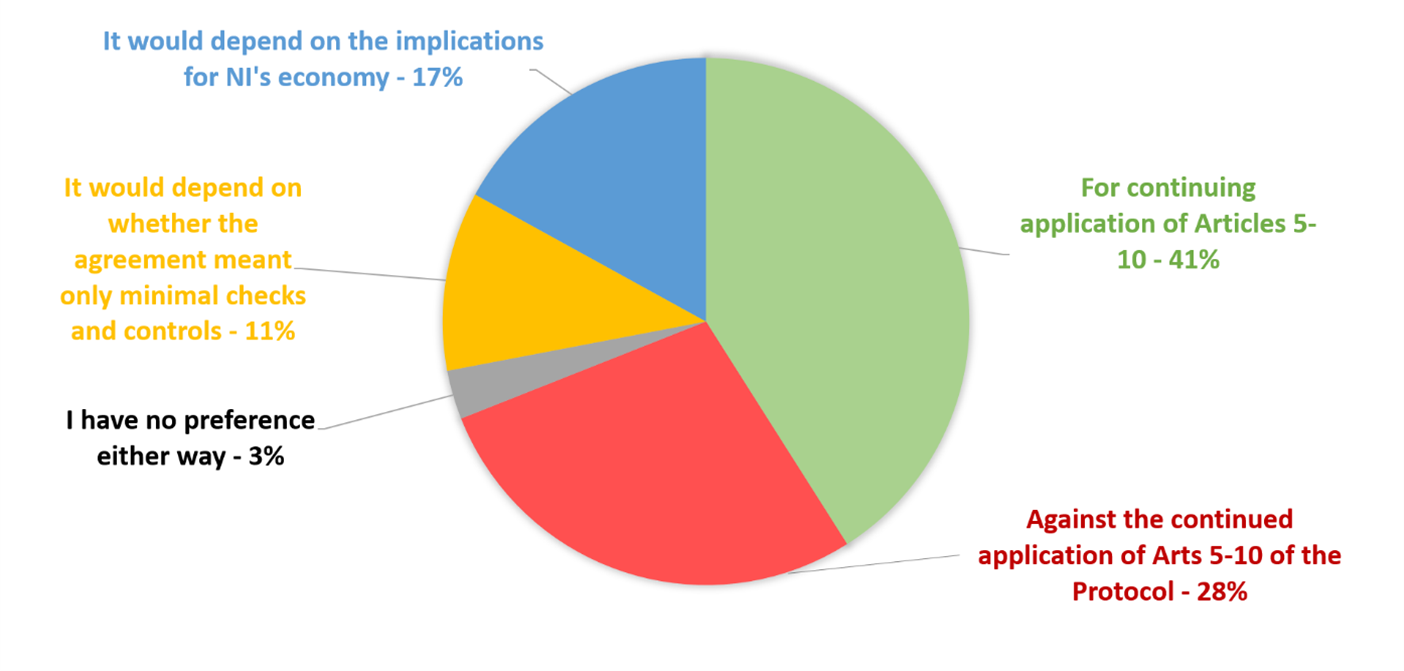
Figure 10. If the UK and the EU agreed a reduction on required checks and controls on goods moving from Great Britain to Northern Ireland, how would you like MLAs to vote in 2024 on the Protocol?
Public opinion on what might come next
The final section of the poll involved a re-run of some questions regarding the possibility of unilateral action by the UK government on the Protocol, and some questions on the significance of recent political developments for the Protocol.
A first set of questions concerned views on the ongoing UK-EU dispute over the Protocol. Responses reveal a clear majority (71%) in favour of a negotiated EU-UK settlement of outstanding issues regarding the implementation of the Protocol rather than the UK taking unilateral action (see Figure 11). One fifth of respondents (22%) disagree. The corresponding figures in June 2022 were 74% and 18%.
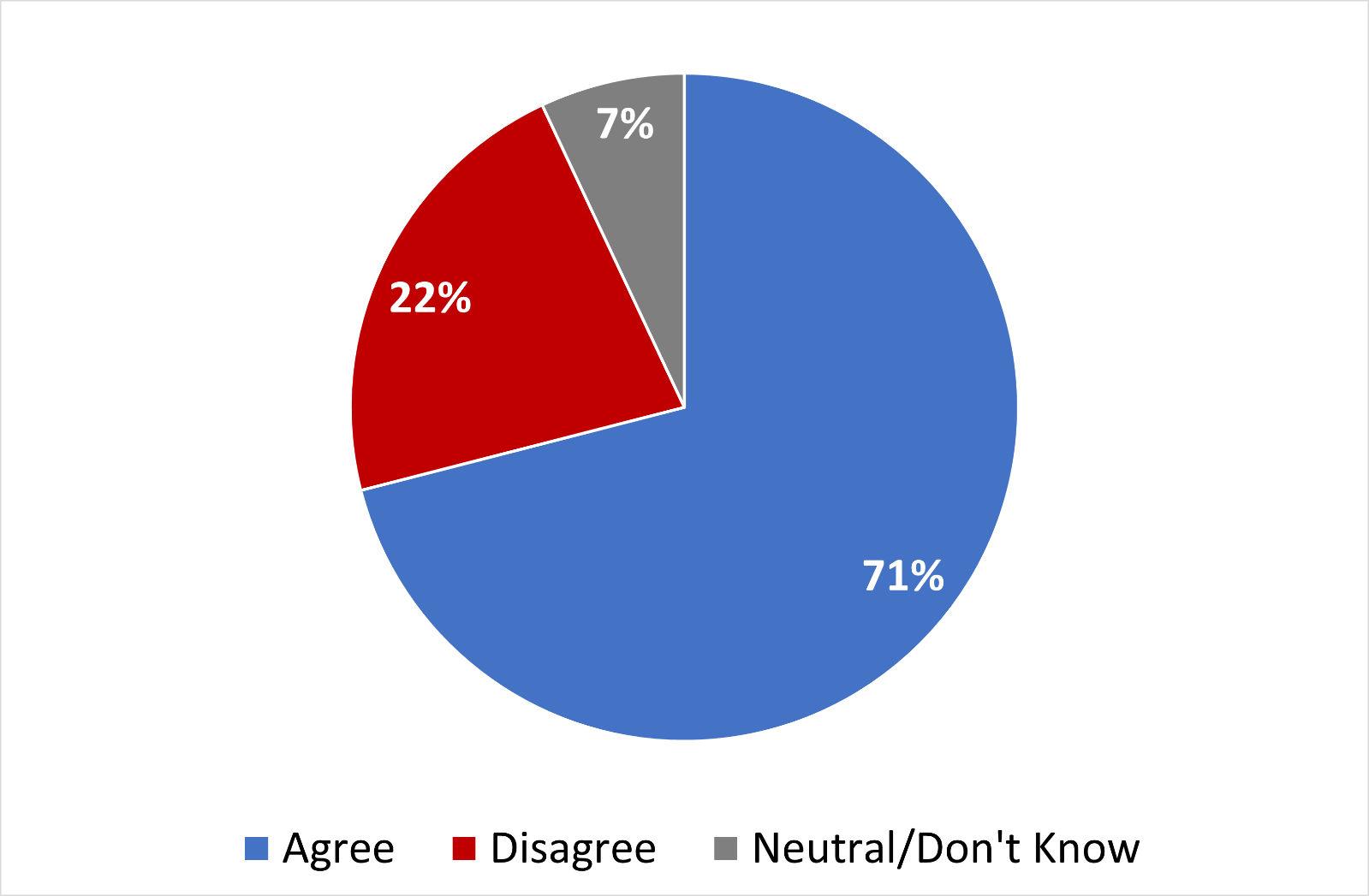
Figure 11 A negotiated UK-EU solution to the outstanding issues with the Protocol is preferable to the UK taking unilateral action
News that the UK and the EU are now once again engaged in talks on seeking to resolve outstanding issues over the Protocol is not, however, a cause for widespread optimism. Just under half of respondents (46%) are optimistic about an acceptable solution being found, while a third (34%) are not.
In terms of issues raised as part of the dispute, a narrow majority (53%) is content with the jurisdiction of the Court of Justice being ‘a price worth paying for unhindered access to the EU’s single market for goods’. Almost two fifths (39%) disagree, with the remainder being undecided or of no opinion.
A second set of questions considered issues arising from the Northern Ireland Protocol Bill that is currently being considered in the House of Lords, having secured the approval of MPs in July. A core feature of the bill is to enable UK ministers to disapply core elements of the Protocol. A majority of respondents (59%) do not think the UK government would be justified in taking such unilateral action to disapply core elements of the Protocol, even if in doing so the UK would be in breach of international law (see Figure 12). A similar question in June elicited a similar sized majority (57%).[5] Over a third of respondents (36%) agreed that the UK would be justified in taking such action; in June the proportion was similar (38%).
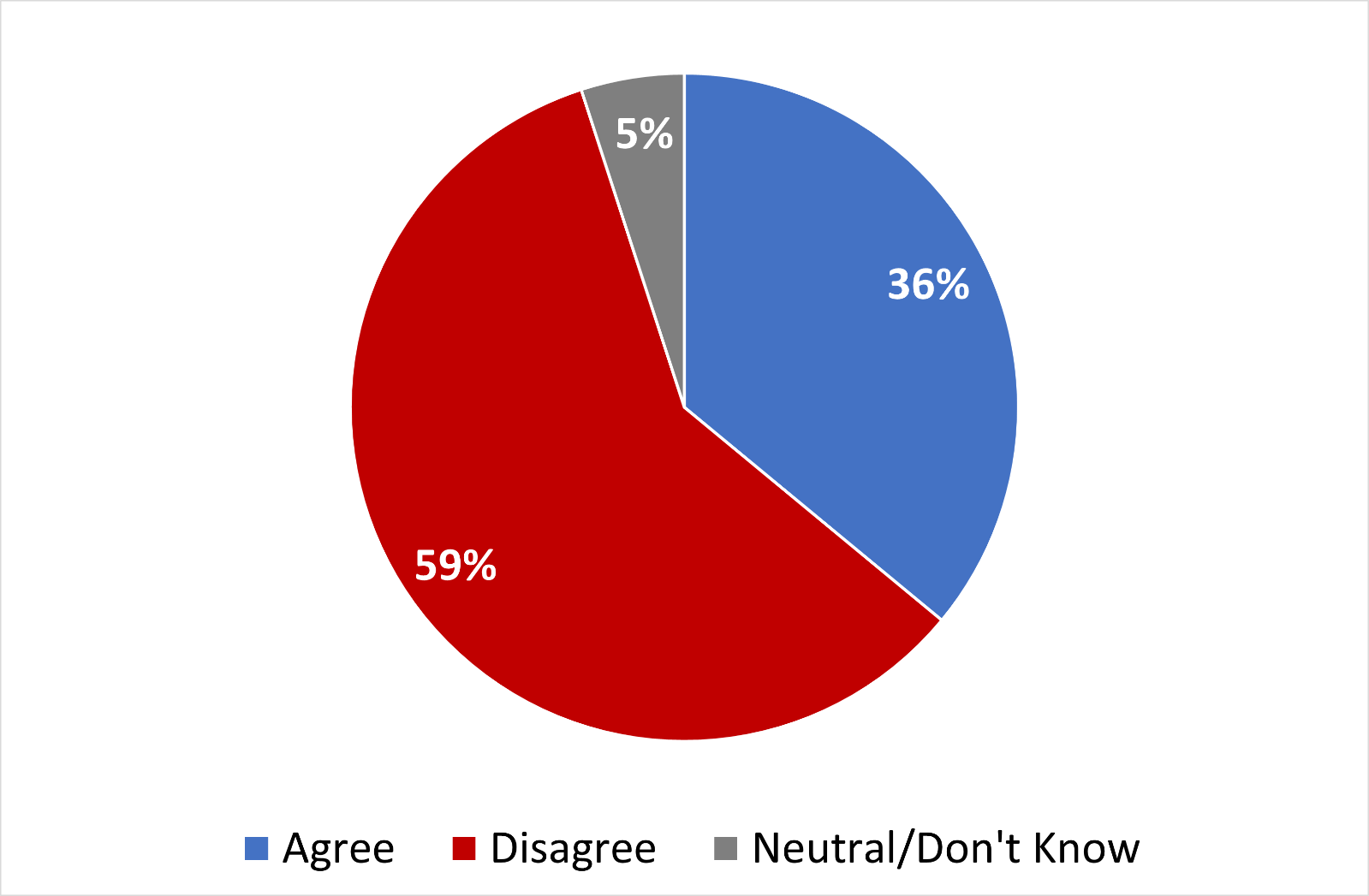
Figure 12 The UK government would be justified in taking unilateral action to disapply core elements of the Protocol, as per its NI Protocol Bill, even if this is in breach of international law
And if the UK government did take unilateral action, would the EU be justified in taking retaliatory action, including potentially suspending the trade provisions of the UK-EU Trade and Cooperation Agreement? Half of respondents (52%) agreed that it would be justified; 37% disagreed (Figure 13). Again, the figures are in line with the responses to a similar question asked in June 2022, when 55% agreed that the EU would be justified in taking unilateral action and 35% disagreed.[6]
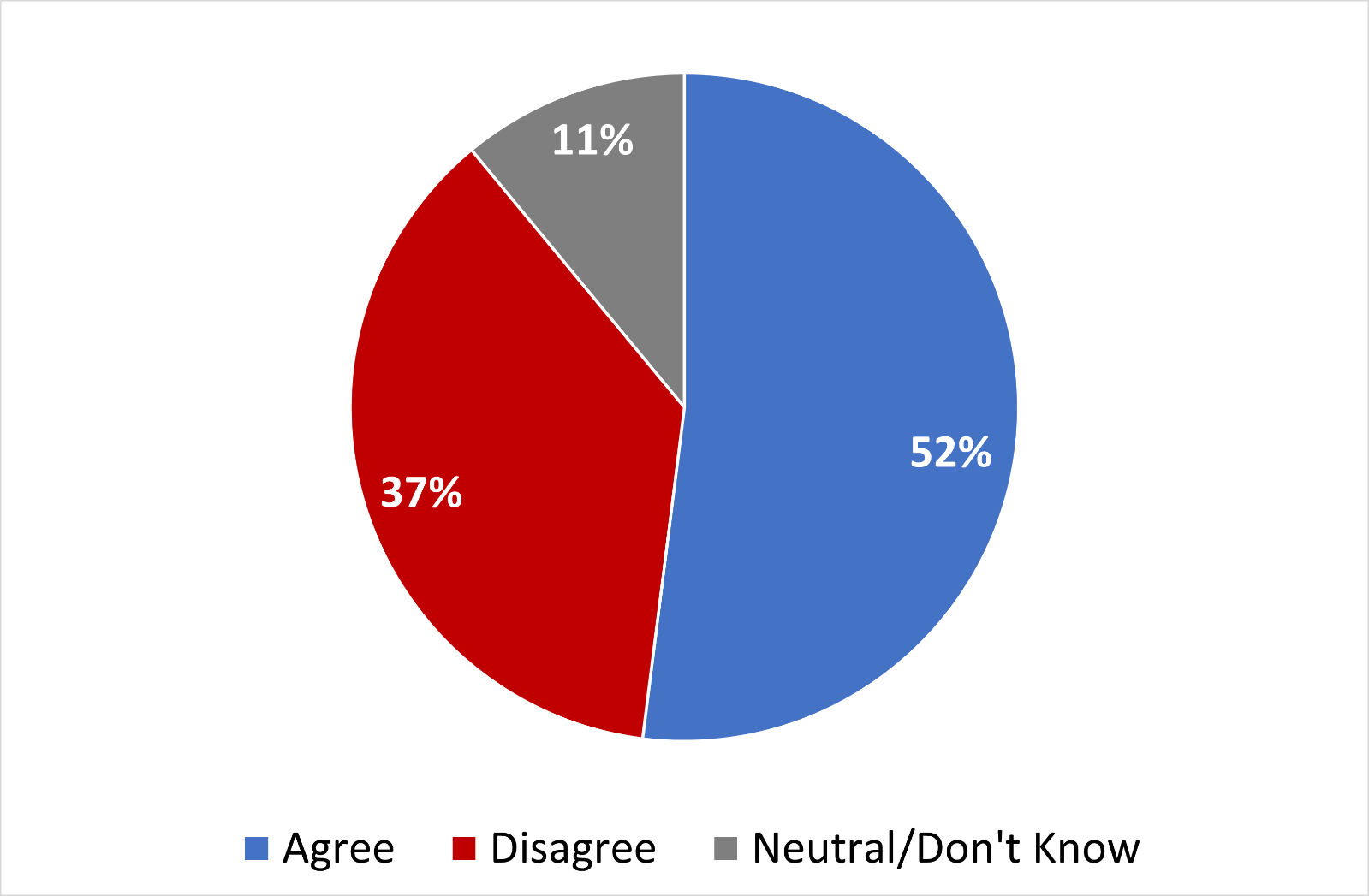
Figure 13 The EU would be justified in taking retaliatory action, including potentially suspending the trade provisions of the UK-EU Trade and Cooperation Agreement, if the UK unilaterally disapplied elements of the Protocol
On whether, through the Northern Ireland Protocol Bill, the UK government should grant its ministers discretionary powers to legislate in place of the Protocol without the need for prior parliamentary approval, a majority of respondents (56%) also disagreed. Fewer than one in three (29%) agreed.
And in relation to the UK proposal for a dual regulatory regime that would allow goods in Northern Ireland to be produced and/or sold according to UK or EU standards, views were almost evenly split on whether respondents would like to have the choice of purchasing goods in Northern Ireland that do not conform to EU standards: 40% agreed, 42% disagreed.
A third set of questions considered views on the establishment of a Northern Ireland Executive in the light of the current situation with the Protocol. 30% of respondents agreed with the proposition that the Northern Ireland Executive should not be established until the Protocol is scrapped altogether; two-thirds (66%) disagreed. Almost the same proportion (65%) were of the view that the Northern Ireland Executive should be ‘fully functioning regardless of what happens on the Protocol’; almost a third (32%) disagreed. In the case of both questions the number of ‘neutral’ or ‘no opinion’ responses was low (≤ 4%).
A final question was whether voters believe official US government pronouncements on the Protocol and the 1998 Agreement have been helpful. Views were evenly split: 44% agree, 44% disagreed.
The full report can be downloaded here:
